04 February 2022
Here are the next set of spellings. Can you challenge yourself by playing the speed write game.

Year 1: who, what, when, why, which, how
Year 2: move, Mr, Mrs, old, only, parents, past, pass, path, pole
Please practise your spellings ready for the spelling test on a Friday.
04 February 2022
Our spelling focus this week has been on using apostrophes for possession and omission.
This week for homework, we would like you to write six sentences that demonstrate how to use an apostrophe for omission (can’t).
We would then like you to write six sentences that demonstrate how to use an apostrophe for possession (sister’s / sisters’).
04 February 2022
We are being historians through our topic learning this half term. Have you ever wondered what it’d be like to be around during historic events like the Great Fire of London? For this week’s Talk Time, we’d like you to do exactly that.
Would it be good to travel back in time?
Would it be good to travel forwards, into the future?
When talking about travelling back in time, you could use these question prompts to support discussions at home:
- What time period would you travel back to?
- a time from recent history (eg your lifetime)
- a point from your parents’/grandparents’ lifetimes
- over 100 years ago
- Where in the world would you like to be at that point in time?
- Does it relate to an important historical event?
- What have you learnt in a current or past history topic that you’d like to experience?
- Who would you like to meet?
- What historical figures have we learnt about at school?
- Are there people you’d meet who aren’t famous eg family members?
- Is there anything about the past that you’d try to change?
- If so, how would you go about it?
- Would you realistically be able to make that change? Would you need help?
Many of the points above will also help you to discuss travelling into the future. As well as those, it’s important to think of what would be gained from travelling forwards in time. When coming back into the present, would you tell people what the future is like (good and bad things) and why?
These R2s will get you thinking critically about your own ideas:
- What reasons can you think of in support of time travel?
- Are there reasons why you might be against it?
- Challenge: Rank your ideas by importance. Imagine you could only do five, or maybe even three things.
Using drama to inspire writing
Year 3 have been busy in their writing lessons this week. To help gather ideas for their writing, the children have enjoyed getting into character and acting out some scenarios. Using drama helps to develop realistic dialogue and extend vocabulary.
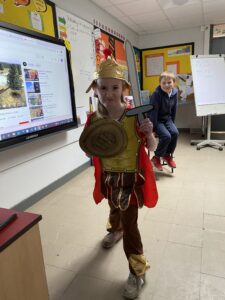
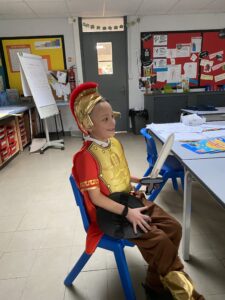
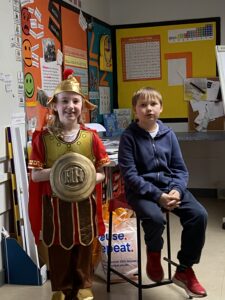
Next week, the class will be writing a recount about the battles between the Romans and the Celts. In order to write this recount, the children need to get into character and tell the story as if they were an actual Celt. The children have certainly been inspired through improvisation and storytelling.
Year 3 have also been exploring some rich vocabulary and some are the words and phrases have been amazing.
blood-thirsty warrior
thundering hooves
deafening screams
trudging through thick mud
staggering, wounded soldiers
smoke filled air
metallic aroma
This afternoon, the class spent some time up levelling basic words using images and a Thesaurus. Then, they looked at the work of their peers to find more ideas for writing. The children are developing a vocabulary-rich classroom and are beginning to use more sophisticated words when they speak and write.
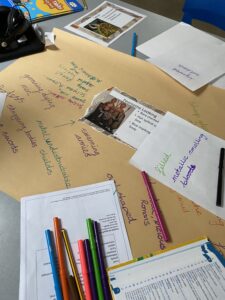
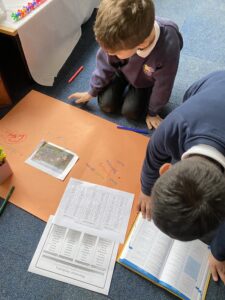
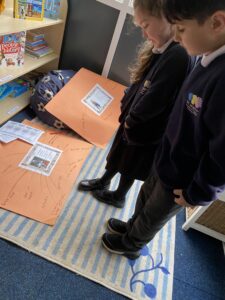
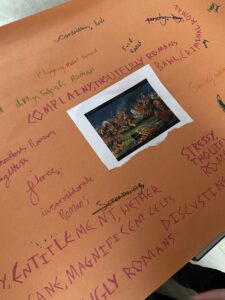
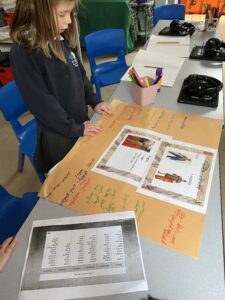
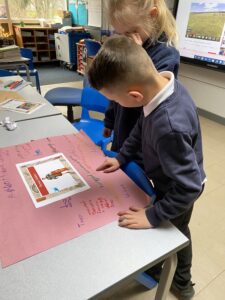
We are really looking forward to reading the recounts.
History
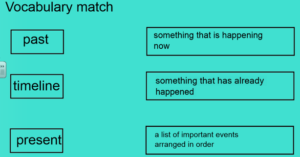

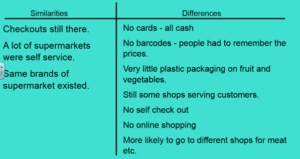

Reading
Be sure to chat to your child about how they’re getting on in their reading lessons – these are every day and help to unpack challenging texts by deciphering the meaning of words, the structure of an author’s writing and often link to our topic or can sometimes be poems.
Here’s this week’s – we explored and defined some new words: adaptation, environments, ancestors and traction.

Area
Year 5 have been learning about area and what it is – check out this animation to help!

English – The Naughty Bus

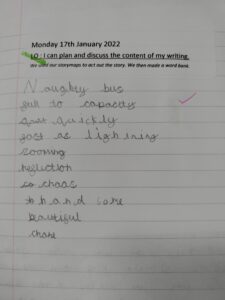
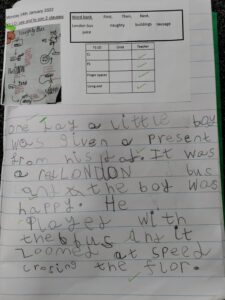
This week’s bible story
The Lost Coin: Luke 15.1-9
Read the story in Luke 15.1-9.
Or suppose a woman who has ten silver coins loses one of them – what does she do? She lights a lamp, sweeps her house, and looks carefully everywhere until she finds it. When she finds it, she calls her friends and neighbours together, and says to them, ‘I am so happy I found the coin I lost. Let us celebrate!’
It doesn’t seem much of a story, does it? A woman loses a coin, she searches high and low, then she finds it and is so pleased that she throws a party for her friends – it’s hardly Harry Potter, is it?
The coin must have been valuable for the woman to search for it so hard and long and to be so pleased when she found it.
This is a parable – a simple tale that is meant to give listeners something to think about. Even this very simple story can have a big meaning.
Reflection:
If I lose something that doesn’t matter to me –
an old leaflet, a broken pencil, a toy I don’t play with any more,
if I lose something that doesn’t matter to me,
it doesn’t bother me much at all.
If I lose something that does matter to me –
some money, my lunch, my favourite toy,
if I lose something that does matter to me,
I search and search and don’t stop until I find it,
or until I know it’s really lost.
Jesus said that God looks for me like that:
searching high and low
never letting go
making sure I know
that I’m so
very, very special.
Prayer:
Dear God,
Thank you that you love us so much you would search for us just like the woman searched for the lost coin. Help us to show our friends how much they mean to us.
Amen
Week beginning 31 January 2022
Sorry you can’t be in school this week. Here are a range of resources linked to what is happening in class. Don’t forget to get in touch with your class teacher if you need support.
Maths
Follow this sequence of maths learning which is linked to decimals.
Lesson 1: video, worksheet, answers
Lesson 2: video, worksheet, answers
Lesson 3: video, worksheet, answers
Lesson 4: video, worksheet, answers
Lesson 5: video, worksheet, answers
Lesson 6: video, worksheet, answers
Lesson 7: video, worksheet, answers
Lesson 8: video, worksheet, answers
Lesson 9: video, worksheet, answers
Lesson 10: video, worksheet, answers
You don’t have to print the worksheet. Your child can write or draw their answers on paper. Your child’s learning will be most effective if you sit with them to pause the clip and check / praise / support your child as the clip moves on.
Practise times tables on Times Table Rockstars, too. Email the class teacher if you need your child’s login and password details.
(Suggested time: 30 minutes of Maths and 15 minutes of Rockstars daily)
Spelling
Look on the homework page to find this week’s spellings. They should choose some past spellings that they feel less confident with. Your child should complete one task each day.
- Day 1: Generate more words linked to the spelling pattern or ‘rule’. You could look out for the words in the book you’re reading at home, or any other text, like a website linked to our science topic of Living Things and their Habitat.
- Day 2: Practise the spellings using two of the ideas in our Super Spelling Strategies guide. (Set yourself and others at home a challenge of using some of the words when you’re speaking, too!)
- Day 3: Write separate sentences, each containing one of the spellings. (Don’t forget to show off really neat handwriting and make sure you sentence starts with a capital letter and ends with a full stop, exclamation mark (!) or question mark (?).
- Day 4: Repeat Task 2 or 3.
- Day 5: Get an adult at home to test you on your spellings. Practise any you spell incorrectly – you could write them out carefully until you’re sure.
(Suggested time: 15-20 minutes daily)
Reading fluency
This is the text we’re using in class this week to build up fluency skills. It’s a promotional text about Jorvik Viking Centre.
In school, we generally follow this sequence:
- Day 1: Read the text aloud with your child listening. Read it clearly and slowly, pointing to each word as you read. Have a chat about any unfamiliar words.
- Day 2: Read aloud each sentence (a full short sentence or part of a longer sentence), and have your child read it back to you. Do this ‘echo reading’ for the whole text.
- Day 3: Read the text and talk about the effect of the punctuation on how you read it – pauses for full stops and expression for exclamations (!) or questions (?). Your child reads the text aloud.
- Day 4: Read together with expression (just like you practised on Day 3).
- Day 5: Your child reads independently and fluently.
(Suggested time: 15 minutes daily)
Reading comprehension
We’ll be using this RIC text in class to practise comprehension skills. RIC stands for:
- Retrieve: finding information in a text
- Interpret: using clues in the text to unlock information
- Choice: thinking about the author’s choice of words, techniques or organisation that make the text interesting and enjoyable to read
This half term we’ll be reading some Norse myths for our topic on Vikings and the Islamic Golden Age. In science, we’ll be learning about evolution. Follow this series of lessons on Mary Anning and Hidden Depths. There’s a whole series of lessons, but start at Lesson 1 and work through, doing one (or maybe even two) each day. (If you’re self-isolating in your second week, stick with the series of lessons you’ve already started and aim to complete the full series.)
(Suggested time: 30 minutes daily)
Writing
Follow these lessons on The Jabberwocky by Lewis Carroll. There’s a whole series of lessons, but start at Lesson 1 and work through, doing one (or maybe even two) each day. (If you’re self-isolating in your second week, stick with the series of lessons you’ve already started and aim to complete the full series.)
(Suggested time: 30-40 minutes for each)
Topic
Our topic this half-term is history.
Follow these lessons on Vikings and Saxons from Oak Academy. Follow the lesson sequence. It has 5 lessons so you could do two a week.
(Suggested time: 30-40 minutes)
Science
Our focus this half-term is light.
These six lessons from Oak National Academy link closely to what we’ve been doing in class last half term. Start at Lesson 1 and work through, doing two or three in the week. If you’ve previously completed one of these lessons, have a go at the ones you haven’t completed yet.
If Science really motivates your child, you could also use look at these lessons all about practical Science.
(Suggested time: 30-45 minutes)
PE
Don’t forget to do some daily exercise!
Do two or three of these Five Minute Moves from Joe Wicks each day – spread them across the day as if they were playtimes, maybe!
Try working through this series of 25 lessons from the Association for Physical Education – do two or three in the week.
(Suggested time: 5 minutes daily, plus 30 minutes for the longer PE lessons)
Extra stuff…
As an extra (or as an alternative, if this helps to motivate your child)…
Geography isn’t a topic-driver this half-term, but you could brush up on your locational knowledge – something that was missed when schools closed earlier this year. You could explore some online maps and try to memorise some new countries, capitals, rivers and mountain ranges. These three lessons about Europe are worth checking out.
What about some Living and Learning? While you’re away from school, you could check out these lessons on money!